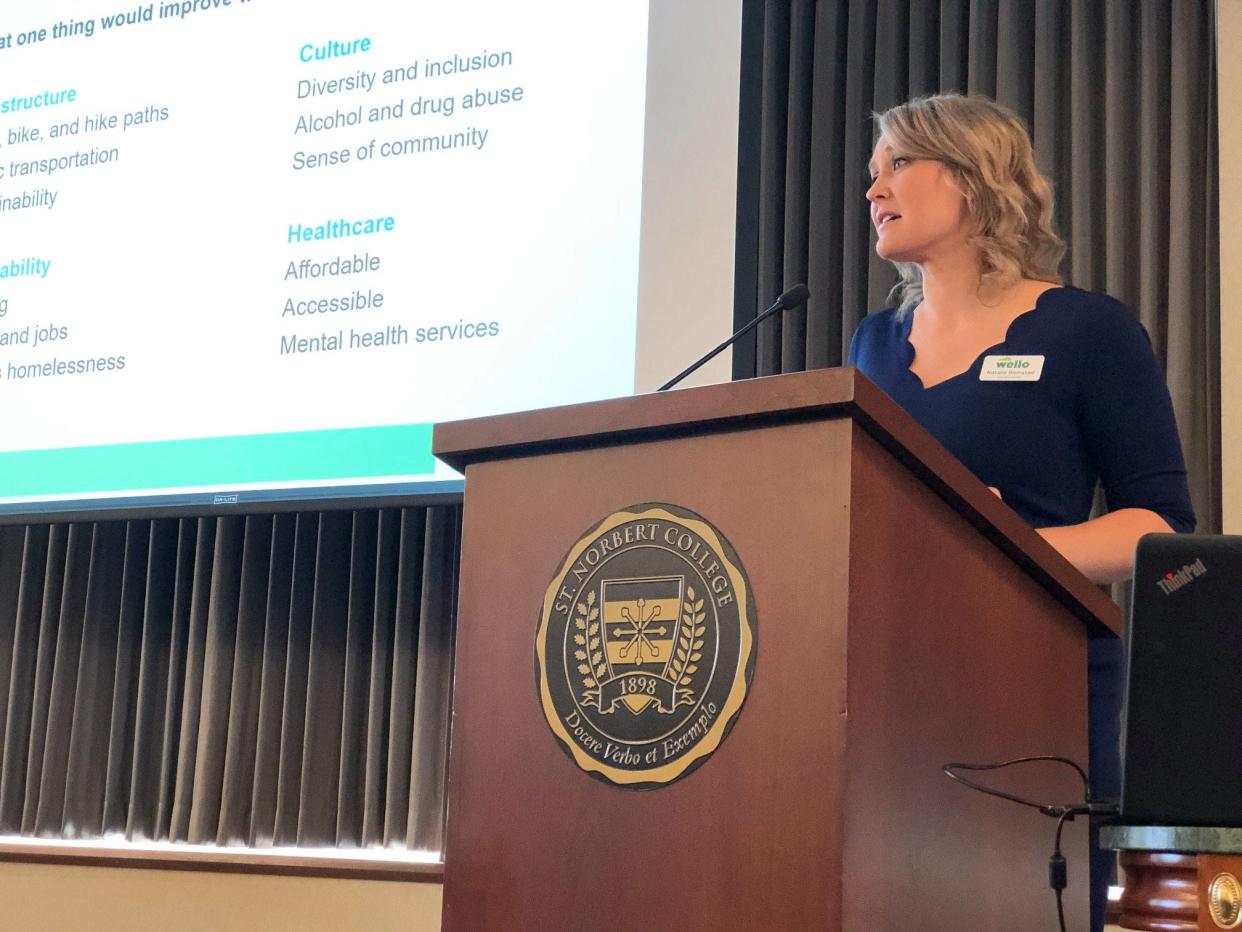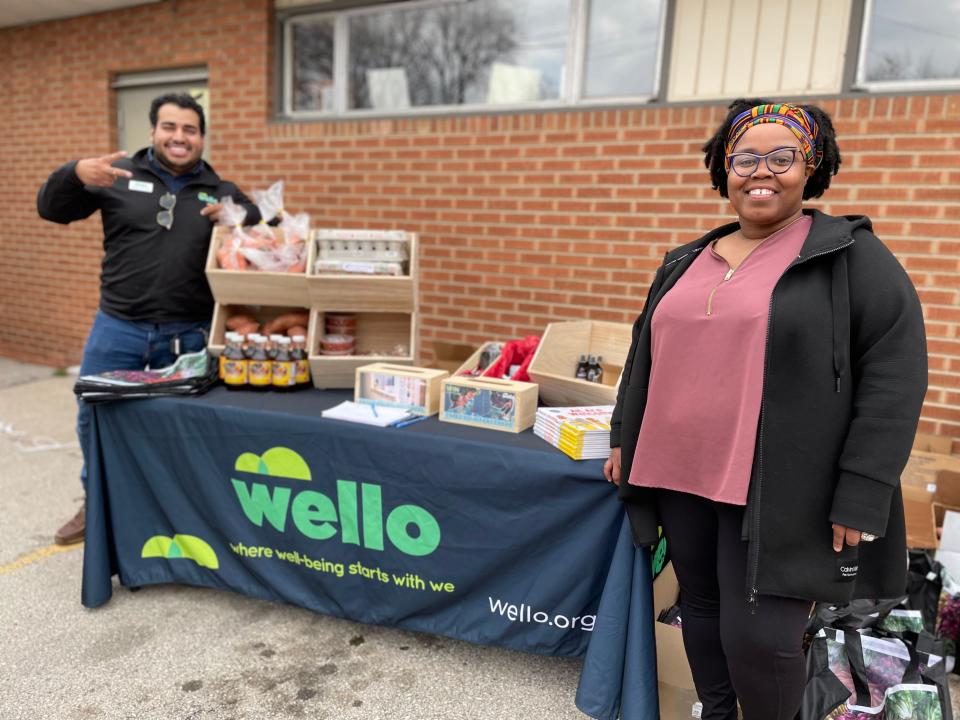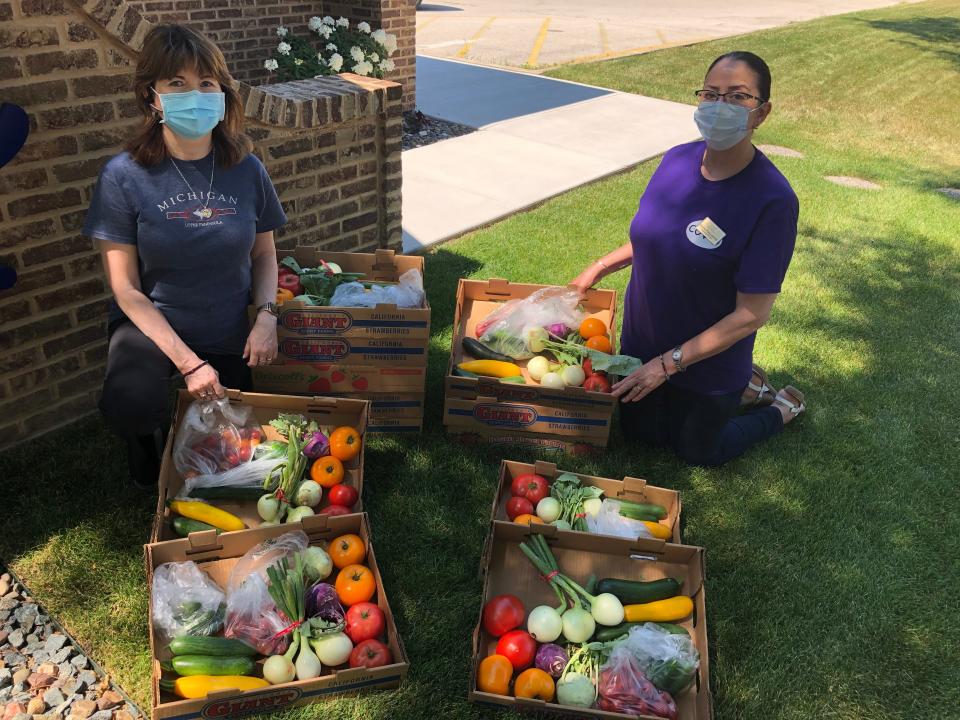New survey results show Greater Green Bay residents are sadder, more isolated and less hopeful of the future

GREEN BAY – Brown County residents feel less hopeful about the future and are more anxious, depressed, isolated and sleep-deprived than they were before the pandemic, according to a new community wellness survey.
On the plus side, people are taking more walks.
Wello released the results this week from its second biannual Community Health and Well-Being Survey. The survey compared its 2021 findings with 2019 results released last year, showing a unique side-by-side view of community health prior to COVID-19 and during the pandemic's global hold.
The most recent survey added new opportunities for people to identify their sexual orientation, employment status, mental health and sense of belonging.
Besides the earth-shattering pandemic, the significant shift between Wello's 2019 and 2021 surveys came down to demographics, with 2021 coming closer than its previous survey to a true representative breakdown of the various populations within Brown County.
Based on the most recent census data, 79.2% of Brown County residents are white, 9.7% are Hispanic or Latino, 3.5% are Asian, 2.9% are Black, 2.5% are Indigenous and 2.2% are multiracial. Of the 688 Brown County adults who took Wello's 2021 survey, respondents self-reported as 84.2% white, 6.6% Hispanic or Latino, 4.5% Asian, 1.5% Black, 1.5% Indigenous and 1.8% multiracial.
Also, 13.9% of Brown County respondents self-identified as LGBTQ, according to Wello's 2021 survey, which gives insights into specific disparities.
These percentage breakdowns give community decision-makers a more accurate snapshot of the power of belonging in Brown County, and the effect that inclusion has on mental health, said Natalie Bomstad, executive director of Wello, a Green Bay-based nonprofit and charitable organization focused on local health and wellbeing. The results demonstrate a strong correlation between feeling unwelcome in a community and experiencing poor mental health, she said.
Respondents who said they had a great sense of belonging in Brown County struggled less with anxiety and depression and felt they could influence decisions in the greater Green Bay area. People who said they didn’t feel welcome in the greater Green Bay area indicated that they are more often depressed, anxious and can’t change or influence the environment in which they live.

Bomstad said that, while such correlations aren’t revelatory, they emphasize the potential that comes with having a sense of belonging. Those who reported that they didn't feel like they were part of the community cited political division, a lack of diversity in leadership positions, a residence too far from the established community and a feeling this is not "their" town.
People who self-reported a strong sense of belonging said that sense comes from being born and raised in Green Bay, an ability to be active in the goings-on around town, caring about the community and having access to needed services.
It's the difference that comes with being siloed and integrated, Bomstad said, a discrepancy that wasn't helped by the pandemic.
“People tend to think of ‘social connectedness’ and ‘belonging’ as kind of squishy,” Bomstad said. “It’s not. It’s very directly tied to someone’s overall wellbeing.”
It wasn’t only the pandemic that threw the community for a loop. The murder of George Floyd and the subsequent social justice movement that erupted across the country shook the community, too, Bomstad said. That further shifted Wello’s survey baseline.
Bomstad expected some of the mental health results, which pretty much align with state and national levels, but what surprised her was the frequency with which respondents struggled daily with anxiety, depression and problems with emotions. More than 50% faced mental health issues one to eight days out of the month, and nearly 12% endured those problems nine to 15 days out of the month.
Additionally, women’s mental health in Brown County has dramatically declined. Where before the pandemic, 63.1% of women had hope for the future, by 2021 that number was down to 44.4%. It dropped eight percentage points for men between that same period, but it should be noted men’s optimism wasn’t inspiring to begin with: Before the pandemic, 45.4% of the county's male survey-takers were hopeful; in 2021, men were 37.5% hopeful.
With hopelessness comes sleeplessness, anxiety, depression and other low feelings. All these elements contribute to a drop in overall quality of life. While 65.3% of people in 2019 said their overall quality of life was "good," it sank to 46.2% in 2021. And where a marginal percentage said their quality of life was "poor" in 2019, it rose to a whopping 9.7% in 2021.
So, where do we go from here?

Resource centers across Brown County have done their best to prioritize the flood of clients coming in with unique needs, but being client-first means they don't always have time to come up for air and focus on more widespread issues like food insecurity.
Tanya Londo, a crime advocate from Green Bay-based We All Rise African American Resource Center, said they're so slammed every day that delivering perishable foods to families before they spoil can feel impossible.
"We are so busy here with the tremendous need in this community … that we don't have time to package bread and give it to the client," Londo said. "A lot of the times we don't have time, so it gets moldy and then none of the clients get this bread."
It's an apt metaphor, one Wello understands all too well. Bomstad said for agencies like We All Rise, Casa ALBA Melanie, COMSA and other culturally specific resource centers, Wello's role is to provide data-centered support and capacity.

Data from Wello's 2019 survey led to the organization declaring racism a public health crisis, with actions to take and Wello's commitment to work with community leaders to incorporate anti-racist principles and training opportunities.
Wello also partnered up with resource centers including We All Rise, Casa ALBA Melanie, Crusaders de Justicia and the Medical College of Wisconsin in July to use grant money to map out food needs across Brown County, coordinating with local farms to distribute produce boxes.
"We know that when people are eating high-quality food, their mental health increases, right? The way that we're distributing, it really brings people together and creates social connection," Bomstad said.
Taking walks, while simple, is another means of elevating mental health.
Panel members, which are survey-takers with whom Wello has periodically followed up over the last four years, said in the 2021 questionnaire they're taking walks every day or almost every day.
Some of that renewed outdoors spirit was undeniably a response to the pandemic, but transforming the greater Green Bay area into a more walkable, bikeable city has been part of Wello's mission since 2012 when it convened the Greater Green Bay Active Communities Alliance.
The physical need for "human-made spaces" was further emphasized after Wello's 2019 survey results, which demonstrated a need for more sidewalks and bike lanes. Wello launched its campaign, "Yield to Your Neighbor," which has worked with law enforcement from Green Bay, De Pere, Ashwaubenon and the Brown County Sheriff's Department to evaluate and enforce pedestrian safety across 30 Brown County locations.
It starts with trust, establishing authentic relationships and changing the small ways we interact with each other, Bomstad said.
“You can’t just go boil the ocean. It starts with the water in your glass,” Bomstad said. “How do you take collective action around data? It really is about starting small and doing it in a way that creates that belonging and inclusion. I don't think you can over-engineer that.”
Natalie Eilbert covers mental health issues for USA TODAY NETWORK-Central Wisconsin. She welcomes story tips and feedback. You can reach her at [email protected] or view her Twitter profile at @natalie_eilbert. If you or someone you know is dealing with suicidal thoughts, call the National Suicide Prevention Lifeline at 988 or text "Hopeline" to the National Crisis Text Line at 741-741.
This article originally appeared on Green Bay Press-Gazette: Green Bay Wello survey results emphaize mental health, belonging
